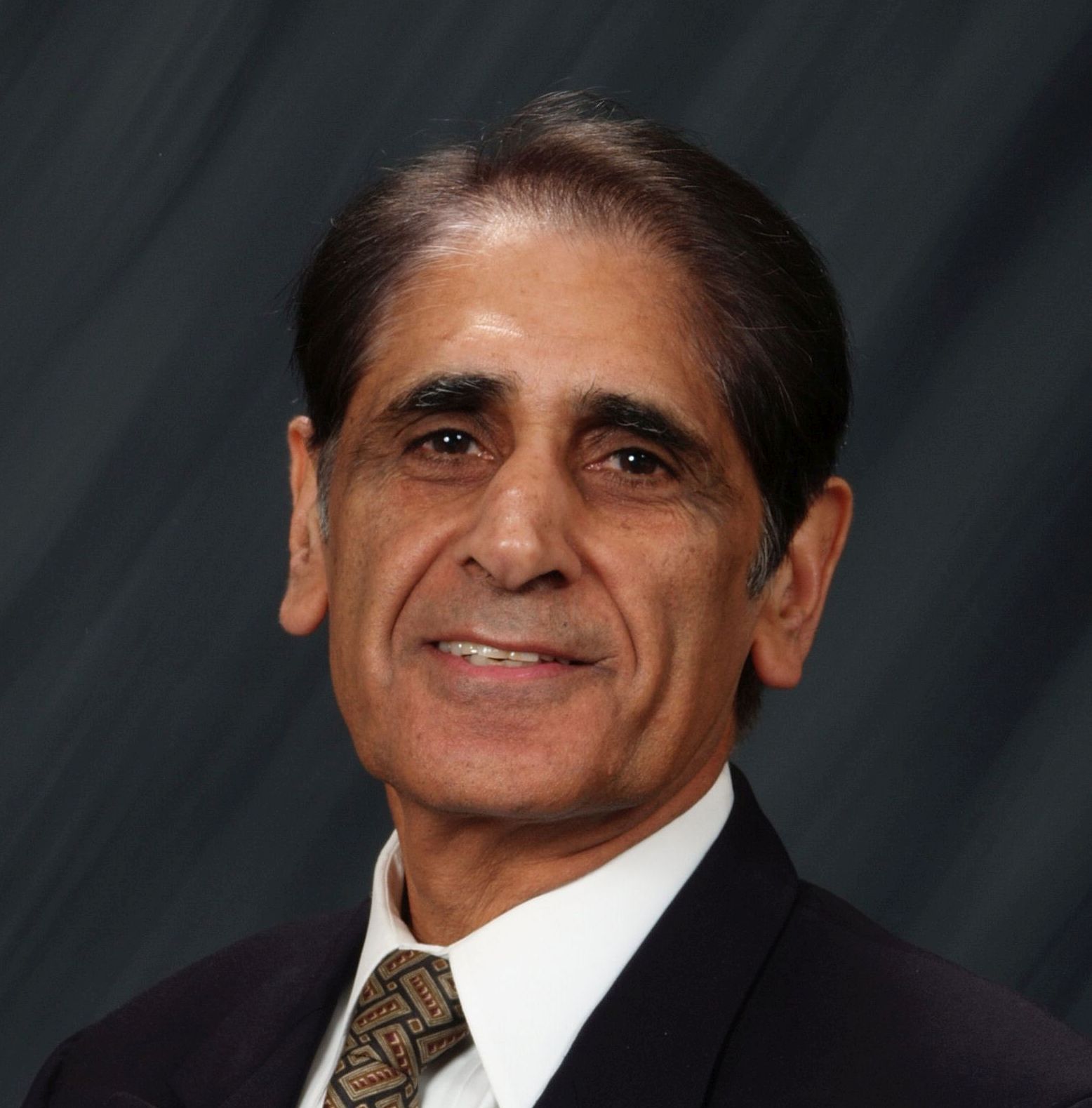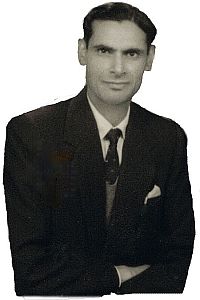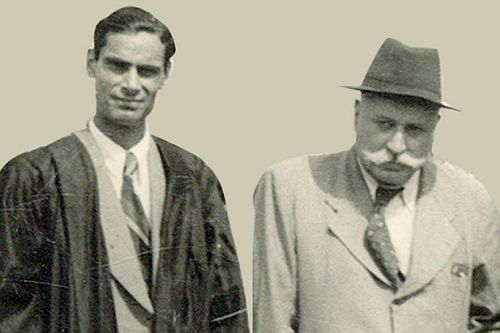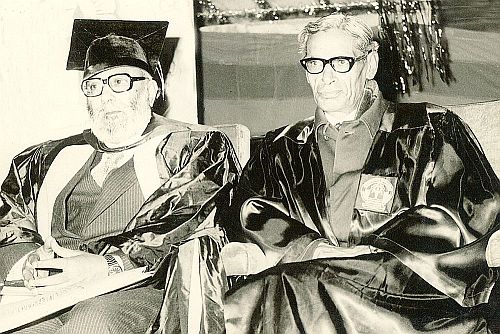My father - Professor Bhatla
Category:
Tags:

Manmohan Bhatla, born in 1939, studied at Punjab Engineering College, Roorkee University, and got his Ph. D. from Oklahoma State University. He worked for Roy F. Weston, Inc. as an environmental engineer for 40 years, and was a Vice President of this company for 30 years. During this time, he led many high profile and cutting edge projects in pollution prevention and remediation for industries in the US and Europe. He received a Medal from the Water Pollution Control Federation for a "Significant Operations Contribution." He has over 25 publications to his credit.

Professor H.R. Bhatla 1911-1992.
Professor of Physics, Punjab, India
These are some of my memories of my beloved father, a very complete and a wholesome human being.
My father, Professor Hans Raj Bhatla, was a professor of Physics. He practiced his cherished profession for 55 years, first as a professor in Government College in pre-Partition East Punjab, followed by in Government College, Hoshiarpur, and Punjab University College, Hoshiarpur. After his retirement, he took up his work again as the Head of the Physics Department at Gandhi Memorial National College, Ambala for another decade of service.
I remember him fondly not just as a father but also as a professional. In post-Partition India, for most of his teaching years, he was also his college's Bursar, apart from teaching Physics. This meant that he was a very busy man on the college campus. He supported numerous aspects of the college administrative life, including watching over the finances, college policies, sports events, student aid and discipline programs, graduation and prize distribution, and all college events and ceremonies. My two years (1954-56) of study at Punjab University College, Hoshiarpur gave me the sense that my father was the prime mover of this giant college machine. He loved it.

Professor Bhatla (left) with Mr Dewan Anand Kumar, Vice Chancellor, Punjab University, at a college function
In spite of a very busy schedule and teaching duties, his passion and avocation was to help the students in all possible ways, and at a very personal level with procuring financial aid, mentoring, and career guidance for studies. My observations lead me to believe that both students and faculty members loved to be with him.
He inspired and helped numerous students to go abroad for advanced education, and personally helped prepare their documents, and even filled their applications. I personally recall several of us came to USA for their Ph. D. degrees in 1961 alone on efforts instigated and supported by my father. I was one of those persons.
One notable example of his persistent nature of assisting students was his championing the push for education of a reluctant youngster with little financial means and an overwhelming resistance from the family to continue education beyond matriculation. This man went to become famous as Dr. Abdus Salam, a Nobel Prize winner in Physics.
Dr. Salam came to India from the UK in 1981 to attend several ceremonies organized to honour him. He sought out Professor Bhatla and visited our home in Rajouri Garden, in Delhi. He recognized Professor Bhatla as a man who invoked in him the love for physics. Dr. Salam's respect for his teacher was genuine.
He refused an invitation for a function organized by the Honourable Chief Minister of Punjab because Professor Bhatla could not be with him on the dais due some protocol. The minister relaxed his requirement, and accommodated Professor Bhatla on the stage. The ceremony was successfully concluded.

Dr. Salam (left) and Professor Bhatla (right), 1981.
In 1954, Professor Bhatla put himself in play for a Ph.D. degree in Physics from Leeds University, England under Dr P.B. Moon. But, he ran into bad luck. The day before the flight to Birmingham, he developed a severe and debilitating backache. He was not able to stand up and function. My father took this in his stride as a divine signal, and decided to drop the idea of going abroad then and there.
Now, when I think about that afternoon, I am still in awe of the difficult decision of my father to drop the work of all preparations made by him and his family for his planned trip abroad. I still wonder about how the future would have played out if he would have completed his studies in England. With hindsight, we did fine with him not leaving us all for an extended period of time.
In personal life, my father was very discriminating and disciplined about the food he ate. He was a foodie but he practiced measured and wholesome eating through food diversity. He did not put on weight.
He was very proper about clothes and dressing. I fulfilled his request for a Basalino hat and an electric shaver when I made my first visit to India after completing my studies in America. Most likely, he inherited this trait from his father, Rai Sahib Bishan Das Bhatla, who was very westernized in grooming and attire because of his lifelong position as an executive with the British military establishment. The British gave him the title of Rai Sahib for his service in London, and he attended the coronation of King George VI.
Still, my father was an intensely family man, and the best father one could ask for.
Let me illustrate.
In April 1961, I was nearing my final exams at Roorkee University (now IIT Roorkee). Just the pressure of upcoming oral presentation got me into a deep depression because of my severe stuttering problem. I must have written a letter to Dad of my dark thoughts of committing suicide. I was surprised to see my Dad showed up at the hostel one morning. He took an overnight train to be with me. The dark clouds cleared with Dad's encouragement.
In the summer of 1961, he was helping me get all the visa papers ready to go for studies in America. I was 21 then, and had completed my Masters in Engineering. On a very hot June afternoon, we were not able to get a riksha to go to the Surgeon General's office, some two miles away, for a medical exam. Dad offered me a ride on his bike, and we had to make several rest stops on the way to escape the intense sun and exhaustion.
In one of the test, I had to read the numbers in a colour book\; it was a test for colour blindness, with which I was not familiar. I failed the test and was declared colour blind. We could not accept it, and did not understand the implication of this failure. So much so, I wondered about my eligibility to go abroad. Dad felt that probably the difficulty was the heat and exhaustion we had come through during our travel to the office. We were able to reschedule the test for the next day. I failed the test again. We looked at each other without any words. In time, I realized that there were no consequences of this deficiency.
I was on my way to USA in August 1961.
Finally, I want to share about my father's hands off encouragement and guidance style he applied to us while we were growing up. His words ring high in my head. He told me, "Remember who your brother is and his accomplishments." Dad motivated me by only pointing me to the role model he wanted me to keep in focus, my brother Pran.
Pran stood second in all of Punjab in Intermediate level exams. He went on to the Indian Institute of Technology Kharagpur (the first IIT of India) and graduated as a civil engineer. He practiced his profession with the state government, with Military Engineering Service at the central government, and the private sector with great distinction.
My father was a great communicator. I loved to read his newsy letters. We exchanged bi-weekly letters for good part of three years while I was in Oklahoma State University working on my Ph.D. I would just wait for his letter, since phone conversation was prohibitively expensive then.
He was up on current events both in India and abroad. He was an avid readers of popular magazines and newspapers such as Time, Life, Look, National Geographic, Filmfare, Tribune, Hindustan Times to name a few. He loved movies. And Dad belonged to a local civil lines club and attended it six days a week. He was one of the finest Rummy players and was known well for this among his colleagues.
I cherish the memories my father created for the whole family and for me. Through his great guidance and devotion, all five of his children became successful professionals.
I revere this forward-looking man of all seasons.
I am certain that all my brothers Pran and Ravinder, and my sisters Bimla and Manorma salute him with reverence, gratitude and love.
______________________________________
© Manmohan Bhatla 2015
Comments
Add new comment